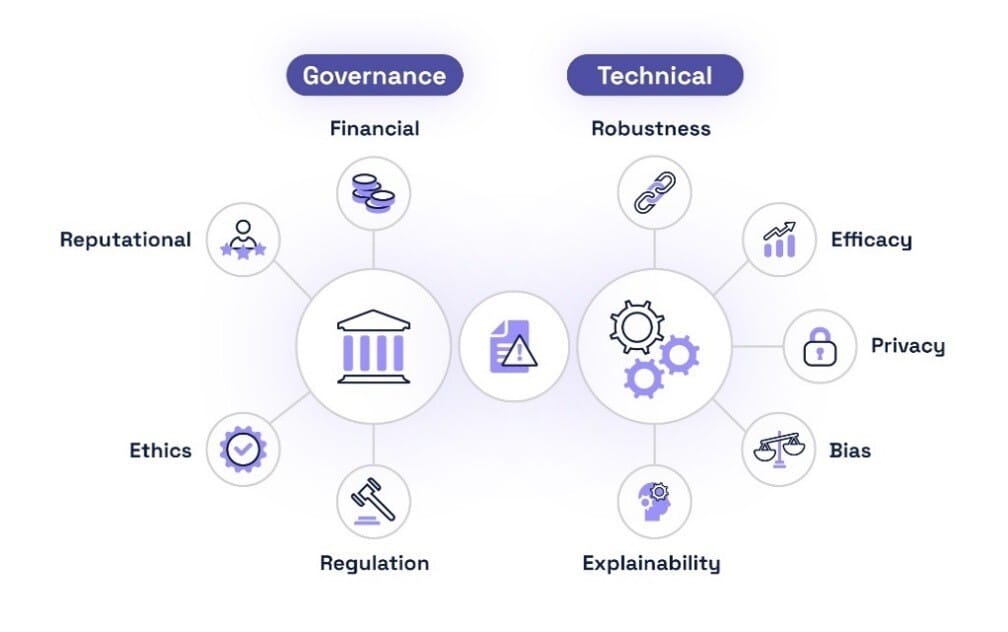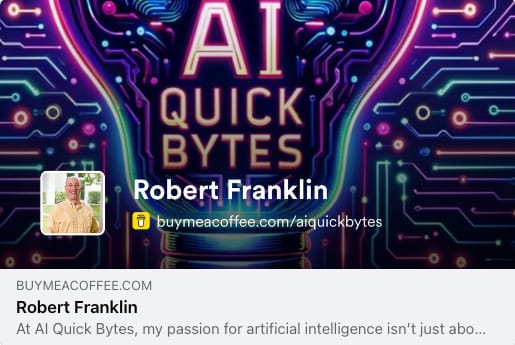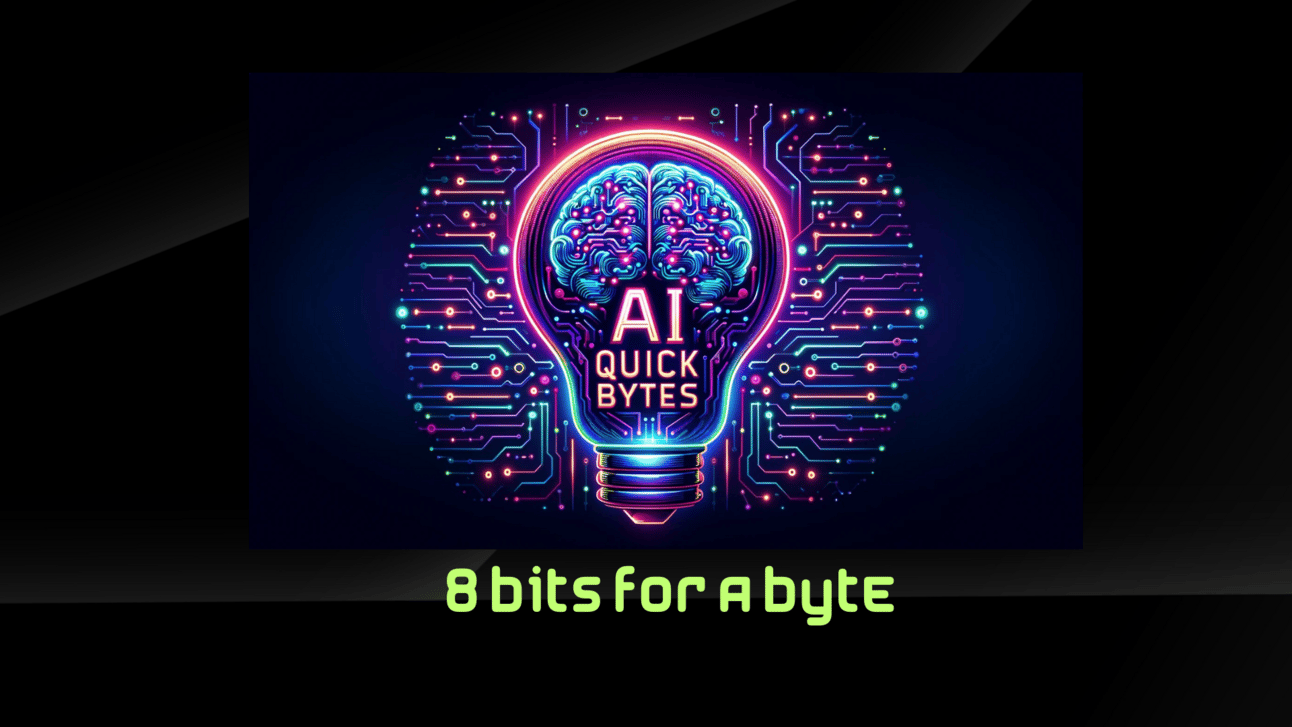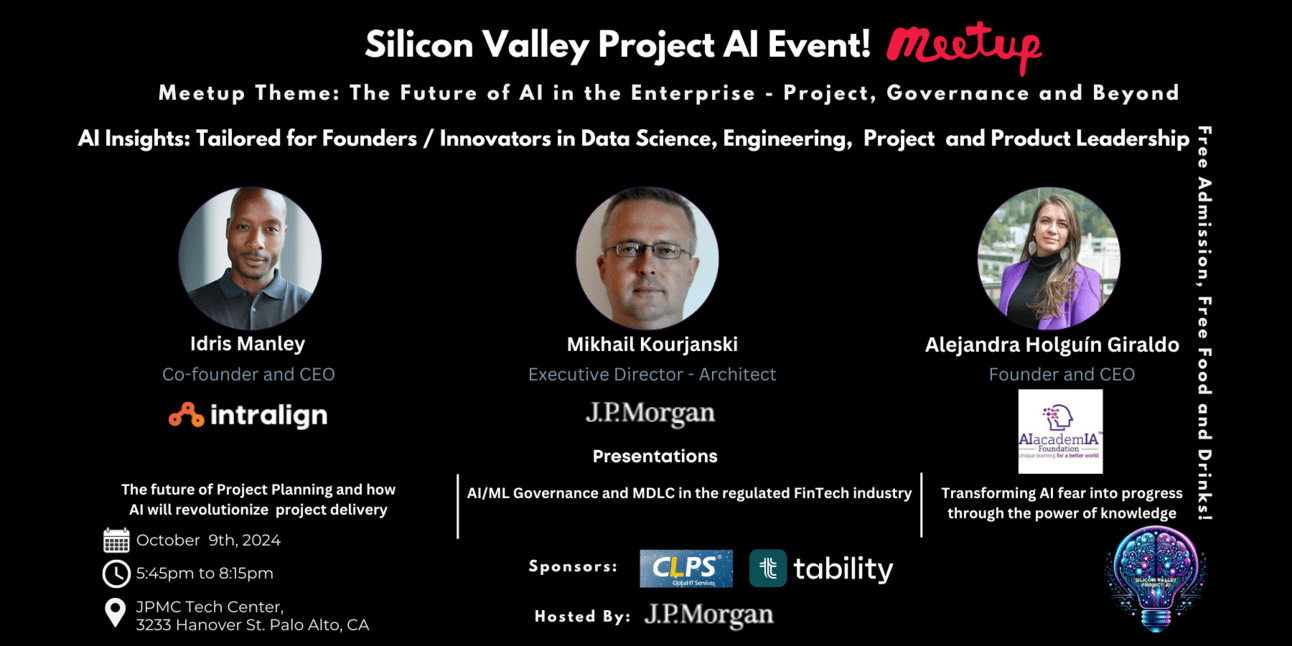8 bits for a Byte: Ready to elevate your AI game? This week's AI insights are too powerful to miss! From empowering your teams with guiding principles to mastering ethical AI deployment, I've uncovered strategies that can reshape how your company approaches AI. These aren't just theories—they're practical steps, proven in real-world scenarios. Whether you're leading a team or shaping company policy, these insights will help you harness AI's potential while safeguarding your organization’s values. Dive in and discover how to build a responsible, scalable AI strategy that drives success.
Thank you for being a subscriber to AI Quick Bytes 🙏. I have been working on perfecting my House Of AI slide to help you implement AI while lowering costs and improving your companies ability to scale. It is yours for free for being a loyal member. Thank you so much for your support. I have also included a bonus AI Core Governance Structures bonus slide!
At AI Quick Bytes, my passion for artificial intelligence isn’t just about algorithms and data—it’s about making the complex simple, the future tangible, and empowering you to lead strategically in the implementation and scaling of AI in your business. Every week, I pour my heart and soul into crafting concise, insightful content that keeps you on the cutting edge of AI trends, tools, and strategies, all with a sprinkle of humor to keep things light and engaging.
But here’s the thing—creating high-quality, valuable content takes time, energy, and yes, money (those coffee beans don’t buy themselves!). By supporting AI Quick Bytes, you’re not just fueling my caffeine addiction (although, let’s be real, that’s part of it), you’re also contributing to a mission to make AI accessible and actionable for everyone. Your donations help cover the costs of research, writing, and all the little things that go into producing content that’s both informative and enjoyable. Donate now.
Whether it’s keeping the lights on, the coffee flowing, or simply allowing me to dedicate more time to curating the best AI insights for you, your support makes a tangible difference. Plus, who doesn’t love the warm, fuzzy feeling of knowing they’re helping someone pursue their passion while getting smarter about AI in the process?
So, if you’ve found value in AI Quick Bytes, I’d greatly appreciate your help to keep this passion project thriving. Donate now.
The Perks of Being an AI Quick Bytes Supporter
Karma Points: Help make AI accessible to all (and score some good tech karma)
Bragging Rights: Tell your friends you're part of the AI revolution
Warm Fuzzies: Know you're helping someone pursue their passion
AI Smarts: Indirectly contribute to your own AI education (sneaky, right?)
Let's Keep the AI Fire Burning!
Your support, whether it's a one-time contribution or a recurring donation, helps ensure that AI Quick Bytes continues to light up your inbox with AI goodness. It's not just about keeping the lights on or the coffee flowing – it's about fueling a community-driven effort to navigate the exciting, sometimes scary, but always fascinating world of AI together.
So, if AI Quick Bytes has ever made you chuckle, raised your eyebrows, or sparked an idea, consider buying me a virtual coffee. Together, we can keep this AI train chugging along, one byte at a time!
Donate now, my wife will thank you and hopefully let me continue on my passion :-).

Get Paid to Refer Friends to Top Jobs
Ever wished you could earn referral bonuses like company employees do? Now you can with Draftboard!
Introducing Draftboard: The platform where companies make their referral bonuses public. Share job opportunities from top companies like SeatGeek, Via, Formlabs, Bilt, Triple Whale, and OneSignal with your network. Get paid when your referrals are hired.
How It Works:
Top Jobs & Companies: Explore job postings from over 80 leading companies in various industries.
Easy Sharing: Use your unique referral link and share it via text, email, or social media
Approve Candidates: Quickly review your candidates and send them to the hiring company.
Track Progress: See the status of your referrals in real-time.
Cash Referral Bonuses: Collect the bonuses for each successful hire.

Let’s Get To It!

Welcome, To 8 bits for a Byte!
Here's what caught my eye in the world of AI this week:

Guiding Principles AI / Company
Empowering teams to lead and make decisions autonomously, guided by leadership-established principles, is a transformative approach. The time invested by C-Suite executives in crafting these guiding principles yields exponential returns in organizational efficiency and innovation. This strategy not only accelerates decision-making processes but also fosters a culture of trust and accountability, enabling rapid adaptation to the ever-evolving AI landscape. By aligning teams with overarching principles rather than rigid directives, organizations can harness the full potential of their workforce's creativity and expertise, driving forward in the dynamic world of AI with agility and purpose.
I witnessed guiding principles powerfully play out at WePay, where I led Product and Engineering leaders to come together, prioritize quarterly work, and self-organize based on these principles. This approach eliminated the need for senior leadership to step in and prioritize work, requiring them only to review the team's recommendations. It was one of the most powerful and proudest moments of my career.
AI Responsibility in the Enterprise has two Key Areas of focus to ensure success and scalability:

📈 Strategy 1: Establish Clear Ethical Guidelines
Develop a comprehensive AI ethics policy that aligns with your company’s values and objectives.
Ensure transparency in AI decision making processes and provide clear explanations for AI driven outcomes.
Example: Google's AI Principles are a great benchmark. They emphasize accountability, transparency, and user privacy.
🔍 Strategy 2: Implement Robust Data Privacy Measures
Prioritize data privacy by incorporating techniques like anonymization and encryption.
Regularly audit your data practices to ensure compliance with regulations such as GDPR and CCPA.
Example: IBM’s approach to data privacy ensures that all AI data processes are compliant with international standards like GDPR.
📋 Strategy 3: Integrate Responsibility into Product Requirements
Include a dedicated responsibility section in your Product Requirement Document (PRD).
Outline ethical considerations, potential biases, and mitigation strategies for each AI feature.
Example: AI Quick Bytes free template for AI PRDs for AI projects include sections on potential biases and ethical implications, ensuring that every AI feature is developed responsibly.
💡 Strategy 4: Foster a Culture of Accountability
Create a cross functional AI ethics committee to oversee AI projects and address ethical concerns.
Train employees on ethical AI practices and encourage a culture of responsibility and continuous learning.
Example: Salesforce’s Trusted AI Principles help ensure all projects adhere to their ethical standards.
Author - Robert Franklin

Quote of the week

Truth! What a great quote. We can make anything possible together!


Illustration of the California State Capitol building in Sacramento.
California is in the process of enacting new AI regulations that will affect millions of people both within and outside the state. This bill tracker offers a resource for those interested in understanding the status of the laws.
The tracker is an Airtable base containing the 30 AI bills that entered the legislative process, and includes tags and categories that can be filtered and grouped. The status of each bill was updated as of Tuesday, September 3.


Continuing the trend of this issue is a thoughtful post by Sam Bowman and the urgency of building in checks and balances into our models - or as I have been sharing building them into our AI DNA.
Executive Summary
As we stand on the precipice of a new era in artificial intelligence, the development of Transformative AI (TAI) presents both unprecedented opportunities and challenges. This comprehensive roadmap, drawing from insights at the forefront of AI research and development, outlines a strategic approach to ensuring the safe and beneficial development of AI systems as they progress towards and beyond human-level capabilities.
The roadmap is divided into three crucial phases:
Preparation: Establishing foundational safety measures and frameworks.
TAI Emergence: Leveraging AI to accelerate safety research and implementation.
Post-TAI Landscape: Navigating the complex terrain of superhuman AI systems.
By adhering to this roadmap, AI developers and stakeholders can foster an environment of responsible innovation, ensuring that the immense potential of AI is realized while mitigating existential risks.
Key Takeaways
Proactive Safety Measures are Paramount The development of robust safety measures must precede the emergence of Transformative AI. This includes solving alignment challenges, establishing comprehensive risk evaluation protocols, and implementing stringent security measures. By prioritizing these efforts now, we create a solid foundation for the safe development and deployment of increasingly powerful AI systems.
AI-Augmented Safety Research is a Game-Changer As AI capabilities approach human-level, we must leverage these systems to accelerate safety research. This symbiotic approach allows us to stay ahead of potential risks, developing more sophisticated safeguards as AI capabilities grow. The key is to maintain human oversight while harnessing AI's potential to solve complex safety challenges.
Governance and Ethical Considerations are Critical As we approach and enter the era of superhuman AI, the focus shifts from technical challenges to governance and ethical considerations. Establishing robust frameworks for decision-making, potentially involving new institutions with democratic legitimacy, becomes crucial. This includes addressing AI welfare concerns and ensuring that the deployment of powerful AI systems aligns with societal values and goals.
Since it is the weekend - If you have extra cycles and want to go deep -check out Sam’s research paper “Measuring Progress on Scalable Oversight for Large Language Models.”

Hire Ava, the AI SDR & Get Meetings on Autopilot
Ava automates your entire outbound demand generation process, including:
Intent-Driven Lead Discovery
High Quality Emails with Waterfall Personalization
Follow-Up Management
Free up your sales team to focus on high-value interactions and closing deals, while Ava handles the time-consuming tasks.


This one thread made me chuckle inside when no one was watching :-). A common anti-pattern that I have found in the enterprise is that no one cares about data quality until they care about data quality. Hope that makes sense. Then it becomes a fire drill only to learn that the clean up will impact multiple orgs and is very time and effort consuming.
A great suggestion in the Reddit thread to get the ball rolling on Data Quality is the importance to connect it to bottom line ROI. That seems fair to me!


Friday Funnies 🤣 .
All I can say is don’t get Liam angry!
Seriously:
The evolution of AI service pricing is likely to follow a multi-tiered model. We can anticipate distinct corporate and consumer rate structures, reflecting the varying needs and resources of different user segments. As the technology matures and operational costs stabilize, it's probable that free options will become increasingly limited or potentially phased out entirely.
The shift at this point is primarily driven by the current high computational expenses associated with AI operations. Should computational costs decrease, I strongly advocate maintaining a free tier of service. This approach serves dual purposes: it bolsters positive public relations and, more importantly, aligns with our ethical responsibility to democratize access to knowledge and education. By preserving a free component, we not only enhance our brand image but also contribute meaningfully to global learning and innovation, fostering a more inclusive AI ecosystem.
Read more about Open AI subscription prices.


Executive Summary
As enterprises race to harness the power of AI, they face critical decisions about infrastructure, privacy, and resource allocation. This article examines the evolving landscape of enterprise AI infrastructure, drawing insights from Chaoyu Yang, founder and CEO of BentoML. We explore the shift towards specialized AI systems, the importance of data privacy, and the economic considerations that will shape the future of AI deployment. By understanding these trends and adopting strategic approaches, enterprises can position themselves at the forefront of the AI revolution, driving innovation and competitive advantage.
Key Takeaways
The Rise of Specialized AI Systems Enterprises that develop custom AI systems tailored to specific use cases, combined with high-quality proprietary datasets, will gain a significant competitive edge. While third-party AI APIs offer a quick start, the future belongs to those who can build and deploy specialized AI solutions that align closely with their unique business needs.
Data Privacy as a Cornerstone of AI Strategy As AI workloads scale, data privacy becomes paramount, especially in highly regulated industries. Enterprises must prioritize secure, private deployment options to protect their growing stores of proprietary data. This focus on privacy will not only ensure compliance but also safeguard competitive advantages derived from unique datasets.
The Shift Towards Compound AI Systems The future of enterprise AI lies in compound systems that integrate multiple models, pipelines, and components. This approach allows for more sophisticated applications that can leverage both foundation models and specialized models, access sensitive data, and interact with proprietary software systems. Enterprises that master the development and deployment of compound AI systems will be well-positioned to create more powerful and flexible AI solutions.
Author - Andrew Park

The Future of AI in the Enterprise - Project, Governance and Beyond
Discover the Future: Engage with AI innovators as they share their journey, unveiling breakthroughs and practical wisdom.
Build Connections: Make friendships and forge new business relationships in a community passionate about technology's potential.
Join us for an unforgettable night of learning, networking, and reconnection. Your presence will contribute to a vibrant community eager to explore the endless possibilities of AI.

As I delved into the concept of "future shock" from 1970, I was struck by its profound relevance to our AI-driven world today. This psychological state, born from rapid change, mirrors our current struggle to keep pace with AI's relentless evolution. In my daily work with AI, I've realized that success isn't just about accumulating knowledge, but about our capacity to unlearn, relearn, and adapt swiftly. What amazed me most was discovering that these insights, which feel so pertinent to our AI revolution, were articulated half a century ago. It's a powerful reminder that as we navigate the AI landscape, our ability to embrace continuous learning and flexibility will be our greatest asset.
3 Key Takeaways:
Future Shock: The concept of "future shock," introduced in 1970, describes a psychological state experienced by individuals and societies when faced with rapid change in a short period.
AI's Rapid Evolution: Artificial Intelligence is advancing at a pace that often exceeds human adaptation, requiring constant learning and engagement to keep up with its progress.
Adaptability as a Success Factor: The ability to unlearn, relearn, and continuously adapt to new information and technologies is crucial for success in the rapidly changing AI landscape.
Author - Me :-)

Daily News for Curious Minds
Be the smartest person in the room by reading 1440! Dive into 1440, where 4 million Americans find their daily, fact-based news fix. We navigate through 100+ sources to deliver a comprehensive roundup from every corner of the internet – politics, global events, business, and culture, all in a quick, 5-minute newsletter. It's completely free and devoid of bias or political influence, ensuring you get the facts straight. Subscribe to 1440 today.
Until next time, take it one bit at a time!
Rob






